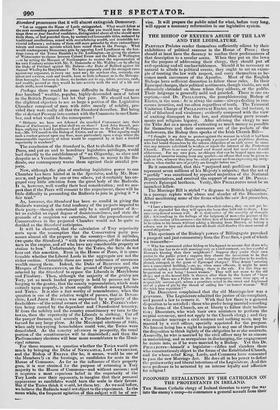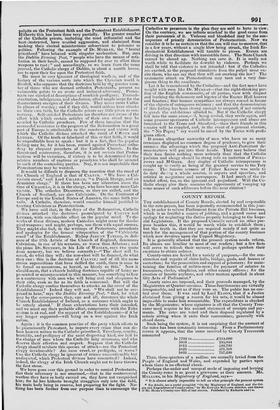pulpits on the Protestant faith and the Protestant Establishment. Hitherto
this has been done very partially. The greater number
of the Catholic priests, including the most influential and the best-instructed, have avoided aggression, and abstained from making their clerical ministrations subservient to polemics or
politics. Following the example of Dr. MURRAY, the " brutal priesthood" have behaved with singular moderation. But, says the Dublin Evening Post, " people who have the means of reta- liation in their hands, cannot be supposed for ever to allow their weapons to rust ;" and accordingly, as we learn from the same journal, the Catholic clergy of Dublin, in about a month hence, are to open their fire upon the Protestant faith. He must be very ignorant of theological warfare, and of the history of the various sects into which the Christian world is
divided, who supposes that the doctrines held by thg greater num- ber of those who are deemed orthodox Protestants, present no vulnerable points to an acute and irritated adversary. Protes-
tants are shocked at descriptions of monkish profligacy. Transub- stantiation, indulgences, and absolution, afford ample scope for the denunciatory energies of their divines. They never enter Catho- lic places of warship; and if they did, would seldom hear attacks on their own faith, for the Catholic priests are little given to con- troversy. Self-satisfied Protestants are therefore not aware of the effect with which certain articles of their own creed may be assailed by Catholic preachers. Few of them imagine that the successful resistance to the progress of the Reformation in a great part of Europe is attributable to the constancy and vigour with which the Catholic divines attacked the creed of Caltviat and LUTHER. Of the truth or falsehood of this or that faith, it would be unprofitable here to speak : but it is a fact, that the popular feeling may be, for it has been, roused against Protestant ortho- doxy by eloquent preachers of the Catholic Church. In the threatened controversy, therefore, it is not certain that Protes- tantism will be victorious, if victory is to be determined by the relative numbers of captives or proselytes who shall be secured by each of the contending parties. Nay, it is not improbable that Protestantism may be worsted. It would be difficult to disprove the assertion that the creed of the Church of England is that Of CALVIN. " We have a Cal- vinistic creed," said Lord Cs-ATHAat, " a Popish liturgy, and an Arminian clergy." if there has been any alteration since the time of CHATHAM, it is in the clergy, who have become more Cal- vinistic. The orthodox Dissenters, as they are called, and the Church of Scotland, are also Calvinistic. On the Continent of Europe and in the United States of America, the same faith pre- vails. A Catholic, therefore, would consider himself justified in treating Calvinism as Protestantism. We have said that, in the days of the Reformation, Catholic divines attacked the doctrines promulgated by CALVIN and LUTHER, with considerable effect on the popular mind. To the works of those divines, modern Catholics might recur for theolo- gical weapons; and might, perhaps, use them with equal success. They might also find, in the writings of Protestants, precedents and apologies for the fiercest vituperation of the "Calvinistic creed " of the Establishment. Bishop JEREMY TAYLOR, in defi- ance of the 17th Article of the Church of England, denounces Calvinism, in one of his sermons, as worse than Atheism ; and the pious Dr. SouTHEY, in his Life of WESLEY, says (we quote from memory, but we believe correctly)—" The elect will be saved, do what they will ; the non-elect will be damned, do what they can : this is the doctrine of CALVIN; and of all the mon- strous superstitions that have defiled the earth, there is none to be found so monstrous, so horrid, so bloody as this." Now it should seem, that a church holding doctrines capable of being re- presented or misrepresented in this manner, has something to fear in a controversy with men who will bring zeal and eloquence to their side, even as far as its faith is concerned. But will the Catholic clergy confine themselves to attacks on the creed of the Establishment? Indeed they will not. "We shall not be sur- prised to hear," says the Dublin Evening Post, " that, let what may be the consequence, they, one and all, denounce the whole Church Establishment of Ireland, as a nuisance which ought to be utterly abated." If these exhortations have their intended, and we must say their probable effect, compromise with the Tithe system is at cud, and the support of the Establishment—if it be any longer supported—will bring on a war against the Irish nation.
Again : it is the common practice of the party which affects to be preeminently Protestant, to impute every crime that can de- base human nature to the Catholic priesthood. Treachery, cruelty, brutality, and profligacy of the most disgusting kind, are laid to the charge of men whom the Catholic laity reverence, and who deserve their affection and respect. Suppose that the Catholic clergy should retaliate this species of attack—are the Protestant clergy invulnerable ? Are none cruel, or profligate, or worse ? Can the Catholic clergy be ignorant of crimes unmentionable but undisputed, which Protestant divines have committed ? Indeed, indeed, the clergy of the Irish Church ought not to have thrown the first stone.
We have gone over this ground in order to remind Protestants, that their adversary is not unarmed,—that in the controversial warfare they have so hotly carried on, they have not vanquished him; for he has hitherto brought stragglers only into the field, his main body being in reserve, but preparing for the fight. No- thing has been further from our purpose than to encourage the
Catholics to persevere in the plan they are said to have in view. On the contrary, we see infinite mischief to the good cause from their pursuance of it. Violence and bloodshed may be the con-
sequence of priestly denunciation of Protestantism. Now we consider it to be as certain as that the sun will rise to-morrow, that in a few years, without a single blow being struck, the Irish Ec- clesiastical Establishment will tumble to pieces. Events are driving in that direction with irresistible force. The State Church cannot be shored up. Nothing can save it. It is really not
worth while to facilitate its downfal by violence. Perhaps we shall be told that violence is not intended : but if the Catholics are excited, as the proposed stimulants from the pulpit must ex- cite them, who can say that they will not overleap the law? The systematic attack on Protestantism may turn out a very dan- gerous thing to the assailants. Let it be remembered by the Catholics—and the fact must have weight with men like Dr. MURRAY—that the right-thinking por-
tion of the English community, of all parties, view with disgust and loathing the dishonesty and bigotry of the Exeter Hall knaves and fanatics; that human sytnpathies are always roused in favour of the objects of outrageous calumny ; and that the demonstration of this feeling has been strong enough to suspend, if not entirely to quash the exhibitions alluded to. But if the Catholic clergy fall into the same error,—if, being reviled, they revile again, and
some genuine specimens of Catholic intemperance and abuse are furnished to the Times and Standard,—then their friends in this
country will be crippled, and, in the event of a general election, the " No Popery " cry would be raised by the Tories with prodi- gious effect.
It seems altogether unworthy of men who have on so many occasions displayed no common degree of prudence, to give their enemies the advantage which the proposed Anti-Protestant de-
monstrations will put into their hands. They may believe that
their foes desire nothing more ardently than that the Catholic prelates and clergy should be stung into an imitation of PHILL-• eons and M'GHEE. Any display of Catholic intemperance is caught up instantly as being of the greatest service to the Tory cause. The famous sermon of Father KEOGH was made to do duty during a whole session, in reports and speeches, and articles in magazines and newspapers. It had much of the in- tended effect, too, on the ignorant and prejudiced. Will the Ca- tholic clergy give their enemies the opportunity of vatnping up some scores of such addresses before the next election ?



























 Previous page
Previous page